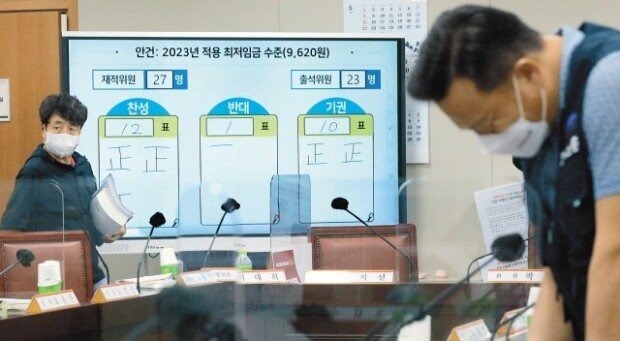Labor, management voice discontent over minimum wage rise
Labor, management voice discontent over minimum wage rise
Posted July. 01, 2022 08:14,
Updated July. 01, 2022 08:14

The Minimum Wage Commission has set the minimum wage at 9,620 won per hour and 2,010,580 won per month for 2023, up 5 percent from this year. As the representatives from labor and management could not bridge their gap, the bill proposed by the commissioners representing public interests was passed through a vote, delivering the verdict on time for the first time in eight years. However, the labor that demanded an 18.9 percent raise and management that called for a freeze or a slight increase until the last minute are expressing a strong dissatisfaction over the decision.
Next year’s minimum pay gain is similar to this year’s 5.1 percent increase. It would be difficult for the pay level to go up by more than the inflation rate, given a staggering 41.6 percent increase in the minimum wage for the past five years, and the pressure on SMEs, and self-employed people caused by soaring prices of raw materials, and groceries due to Russia’s invasion of Ukraine. The rise in the minimum wage may end up encouraging even the highest-paid workers to demand a pay rise. This may be why public interest representatives speaking for the government bumped up the level by just slightly more than 4.5 percent, the consumer price growth rate projected by the Bank of Korea, and kept the hourly wage under the 10,000 won level.
Soaring inflation indeed can be the cause for a pay rise, but the problem is that there are many business owners who cannot afford even a 5 percent raise. One in three businesses with less than five people is not capable of providing the minimum wage to their employees, even at the risk of facing criminal punishment. With weekly holiday allowance included, which is additional pay for a day’s work for those who work for more than 15 hours a week and five days a week, the actual minimum hourly wage reaches 11,555 won next year. The number of jobs with ultra-short working hours, such as 14.9 hours per week, is highly likely to increase.
Minimum pay hikes in recent years, which were sharper than in other advanced countries, came with various side effects, including a rise in the number of business owners working alone after laying all employees off. Also, the skyrocketing wage led to a drain of laborers from the manufacturing sector to the service industry, leaving manufacturing companies, including shipbuilding firms severely understaffed. “Lunchflation,” which refers to the combination of “lunch” and “inflation” to describe the rising cost of lunch for office workers, will only worsen due to the recent hike in the minimum wage.
The only way to respond to the shock of a minimum wage increase amid the crisis of “stagflation,” the combination of economic stagnation and inflation, is to boost productivity through a concerted effort of labor and management. Continued disputes between the two sides amid this unprecedented “economic hurricane” will only make businesses weaker with a reduced number of jobs, making a vicious cycle. Efforts to improve the wage system, including a differentiated pay rise by sector, which was off the discussion table this time, and the abolition of the weekly holiday allowance that does not exist in other advanced countries, must be accelerated.
Ae-Jin Ju jaj@donga.com · Teuk-Gyo Koo kootg@donga.com
Headline News
- Med professors announce intention to leave hospitals starting Thursday
- Bridge honoring Sgt. Moon Jae-sik unveiled in Pennsylvania
- Chief of Staff Chung tells presidential secretaries to stay away from politics
- US FTC bans noncompete agreements
- N. Korea launches cyberattacks on S. Korea's defense companies







